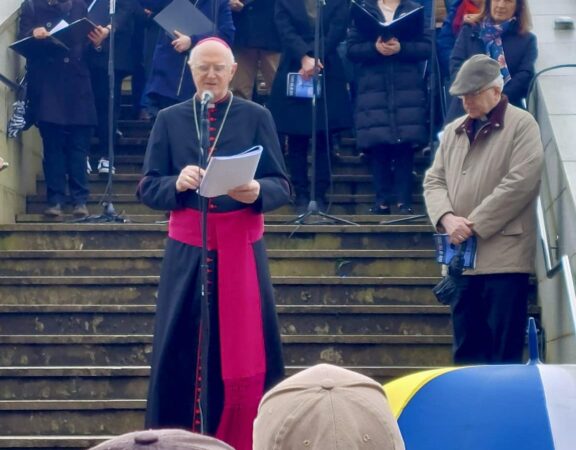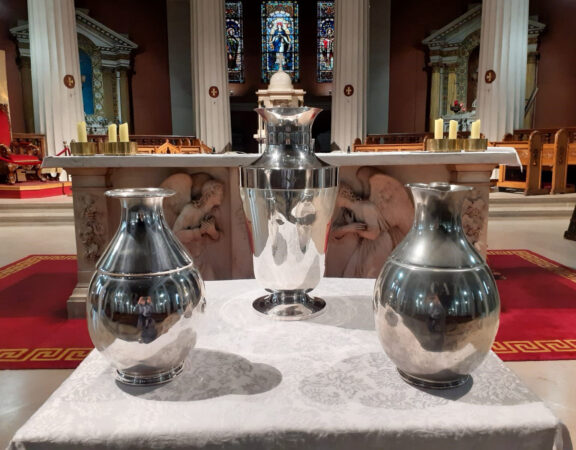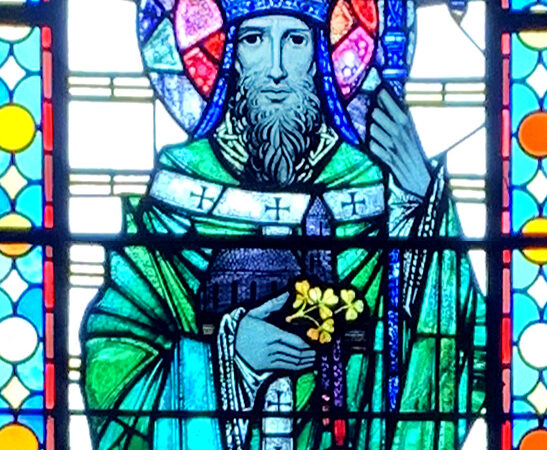Homily Notes of
Most Rev. Diarmuid Martin
Archbishop of Dublin, Primate of Ireland
—————-
Church of Saint Laurence O’Toole, Kilmacud, 12 February 2006
Most Rev. Diarmuid Martin
Archbishop of Dublin, Primate of Ireland
—————-
Church of Saint Laurence O’Toole, Kilmacud, 12 February 2006
The celebration of the World Day of the Sick has become very much an important day in the annual calendar of the Archdiocese of Dublin. I congratulate once again this year all those who, under the guidance of Bishop Raymond Field, have worked so hard to make this event something so meaningful for those who take part in it, for the sick and for the carers, for those who are sick in mind or in body, for families and for those who work in hospitals and institutions, for those who build services and networks of care and solidarity in the community. I thank also those who organised and took part in yesterdays’ seminar “Conversations on Mental Health”.
I thank this Parish of Saint Laurence O’Toole in Kilmacud for hosting our event this year and for making us all feel so welcome. I thank the Parish Pastoral Council, the Priests, the many lay workers, the Parish Choir and the traditional Irish musicians. It is interesting to note that this parish has its own programme for caring for the sick, the Society of Simon of Cyrene, which ensures that the sick and the housebound are made to feel that they are truly active members of the parish community. I greet all those in the parish who are linked with us today through the Parish Radio service.
Jesus had a special love for the sick. There is no other category mentioned more often in the Gospels than the sick and those who were bound down – possessed – by harsh physical and mental burdens. The sick encountered Jesus in a special way as one who had power, from whom power went out. Nothing could impede this power, when it encountered the faith of a sick person.
The meetings that Jesus had with the sick take place in many different settings. In every village he entered they brought the sick to him. The laid them before him for Jesus to touch them. They let the sick down through the roof so that they would be directly in front of him. There is the story of the woman who simply wanted to touch the hem of his garment anonymously. There were others so troubled that they cried out at him in front of everyone. There were those who because of their sickness and their lack of support felt that they would never have a chance of being healed. There were the lepers and the outcasts who were normally ignored and with whom others shunned all contact.
When the disciples of John the Baptist came to ask who he was, Jesus told those disciples to go back to John and say simply that the blind saw and the lame walked again. Jesus’ identity as Messiah is linked with the way he interacted with the sick. Our identity as followers of Jesus must also be marked by the way we interact with the sick. Jesus identifies himself with the sick and tells us that judgment for each of us is linked with how well we recognise that identity: “I was sick and you visited me”.
There is therefore a great variety in the ways Jesus encounters the sick. But there are three things that are common to almost all the miracles and the encounters of Jesus with the sick.
The first is that the encounter with Jesus is always an individual and personal one. Jesus does not work theatrical tele-miracles. He touches each sick person personally. In today’s Gospel Jesus touches the leper with his own hand. For those looking on, Jesus by touching a leper had this made himself unclean. Jesus was not afraid to encounter human reproach in order to use his divine power to heal. Jesus is the hand of God who comes to heal wounded humanity and to overcome the prejudices and the stigma which humans so often attach to those who are sick.
Jesus cares individually today for each one of you sick people. He cares individually for those who suffer physical illness. He cares individually for those who suffer from mental illness – which is the special theme of the World Day of the Sick 2006. He cares for those who are troubled, fearful, insecure, and anxious. He cares for each of you individually. We as Church community care for you individually and support you. We do so today. We do so everyday when we pray in our Mass that the Lord will “protect us from all anxiety” so that we can “live in joyful hope”.
The second thing that is common to all the miracles of Jesus is the reality of the faith of the sick. Jesus stresses that it is above all the faith of the sick that brought them healing and wholeness. There is a sense in which the faith of sick is singled out in the Gospel, not to help us focus on the sick, but to reflect on the shallowness of faith among many who are apparently healthy. Faith requires the ability to recognise our own dependence and not to stress only our self sufficiency, our own needs and concerns, our own advancement. All of us live in a relation of dependence. None of us would be here was it not for the self-giving love of others, especially our parents and those who sacrificed themselves so that we can be fully ourselves.
The sick reminds us that there is much more to life than utility. Each of us possess a dignity would precedes and goes beyond our usefulness at any given moment. A world which prized only the talented, the well and the useful would be an inhuman world. It would also be an insecure world, because all of us would have to live with a fundamental anxiety about what would become of us when one day we to become weak and be considered a burden on society as we became outwardly less useful.
The sick recall all of us to the fact that we need to build a caring society and that that care is mutual. On so many occasions during our diocesan pilgrimage to Lourdes the young people who generously accompany our sick say to me: “You know Archbishop these sick people are happier than we are, with all our opportunity”. These young man and women, very talented and with a great future ahead of them, are often so fragile and insecure in the face of the hard competitive world in which they will have to live. They learn intensely from the wisdom of the sick who have come to see that there are other values in society than just being among the top elite. Paradoxically it is the sick then, those apparently less fortunate, who bring out the best in such a talented group of young people. The sick wish them well and send them on in their life path hopefully with a new vision for their own lives and a new understanding that we need a caring and not just a competitive society. Indeed the fruits of Ireland’s competitiveness and its healthy economy will only be sustainable when they are used also to create and sustain that other essential pillar of a healthy society: a society which cares and where those who care are sustained.
There is a third aspect which is common to all miracles of Jesus. Jesus sends the sick that have been healed back to their families, back into their communities, to take their place once again as participants in normal life. Take the example of the lepers in today’s Gospel. Jesus does not say to them stay with me now and join my team of disciples and render thanks to God for what he has done for you. No, he tells them not to talk, but to go to the priests, to go though the formalities which will recognise them once again as active citizens and no longer marginalized. Healing means bringing people back fully into daily life, as a sign also of the fullness of life to which we are all called.
There is sense that the suffering of the leper in today’s Gospel was as much about his being considered unclean, an outcast in society, as about the physical suffering he bore in his kin. Healing means eliminating that sense of stigma which we, the so called “clean”, so often ungraciously assign to the sick. Just think of the stigma faced by those infected with HIV/AIDS or by some forms of mental illness. Healing means reinserting people back into normal community life. It means removing from them any sense of stigma and marginalisation and empowering them to be the truly human persons, each the individual human person that God created them to be, each welcome and loved.
Our interaction with the sick must never create dependency We must rather rejoice when any sick person can begin again to be more fully himself or herself, able to realise his or he God-given gifts to the fullest degree possible and for as long as possible. The sick, even those whose chances of recovery seem slight, have every right to “future” and to hope as has any other person.
May God’s healing hand be present here among us today as we, as a Christian community, pray for our sick and those who care for them, that the Lord will give them hope and consolation, in mind and body.
Homily Notes ofArchbishop of Dublin, Primate of Ireland—————-Church of Saint Laurence O’Toole, Kilmacud, 12 February 2006









